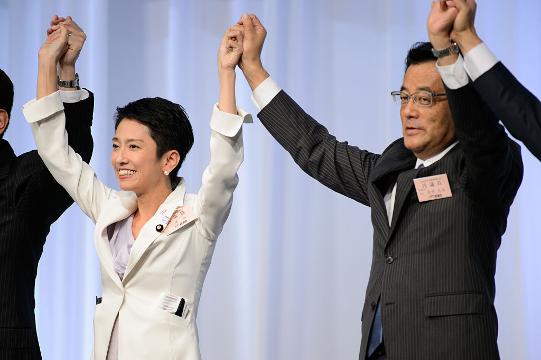Women gain a new political leadership post in Japan

TOKYO — A former model and television newscaster became the first female leader of Japan’s main opposition party Thursday, the third woman elected or appointed to a senior political leadership position in Japan in the past two months.
Renho Murata, 48, easily defeated two male candidates to lead the Democratic Party. She faces the daunting task of returning the party to relevance after a string of election losses and the surging popularity of conservative Prime Minister Shinzo Abe.
Renho — who goes by her surname alone — was first elected to the upper house of Japan’s parliament, called the Diet, in 2004.
She gained prominence during budget sessions by grilling members of the long-ruling Liberal Democratic Party, and served briefly as minister in charge of consumer affairs and food safety and of administrative reform after her centrist party took power in 2009.
The Democratic Party was routed in the 2012 elections, in part for a tepid response to the March 2011 earthquake, tsunami and nuclear power disaster that killed more than 15,000 people. Renho became the odds-on favorite to assume the Democratic Party leadership after the opposition was again beaten badly in upper house elections in July.
Renho’s victory continues a recent winning streak by female politicians in Japan, where women are drastically under-represented in government and business leadership compared to other advanced democracies.
In late July, longtime Diet member Yuriko Koike was elected Tokyo governor, one of Japan’s highest-profile political posts. Shortly after, Abe named Tomomi Inada as defense minister – a critical job that requires close coordination with the United States in countering China’s growing military strength and assertiveness in East Asia.
“The fact that Japanese voters supported a woman in such a critical role is in itself encouraging,” Lully Miura, a lecturer at the University of Tokyo and a researcher at the Policy Alternatives Research Institute in Tokyo, wrote in a blog post last month about Koike’s election.
Only seven other women in Japan have been elected governors of the country's more than 40 local prefectures, and only 45 women were elected to the 475-seat Lower House during the most recent election in 2014.
Whether Renho can parlay her leadership post to become Japan’s first female prime minister is unclear.
Abe’s popularity has rebounded despite a lackluster economy and controversy over his deeply conservative political agenda.
Abe's approval ratings climbed above 60% for the first time in two years in a poll released this week by the Yomiuri Shimbun newspaper, and his party is weighing a rule change that would allow Abe to run for a third three-year term when his current mandate expires in 2018.
In campaigning for her party's leadership this month, Renho pledged an all-out fight against Abe’s plans to revise Japan’s pacifist Constitution to allow offensive operations in some cases.
Renho was born in Japan to a Taiwanese father and Japanese mother. During the party leadership campaign, she was forced to backtrack from previous claims that she had given up her Taiwanese citizenship. She said she has now begun the process of doing so.